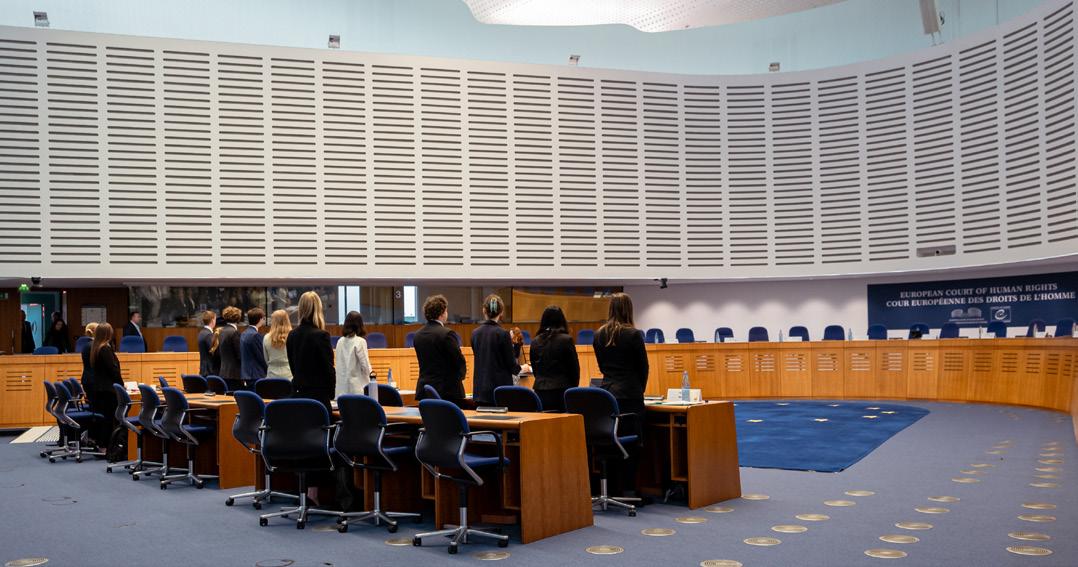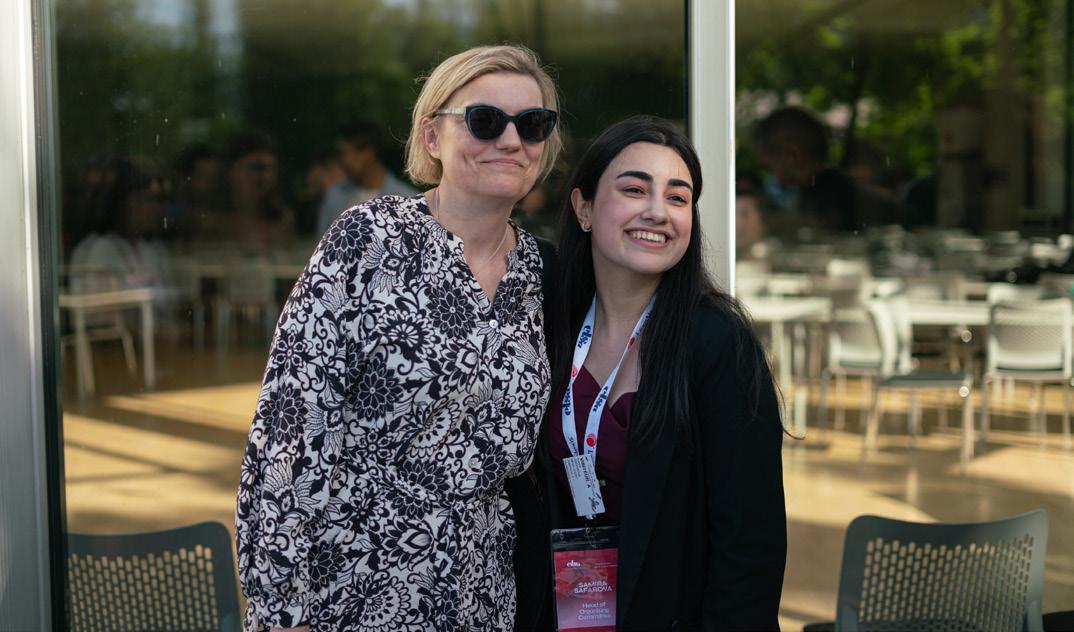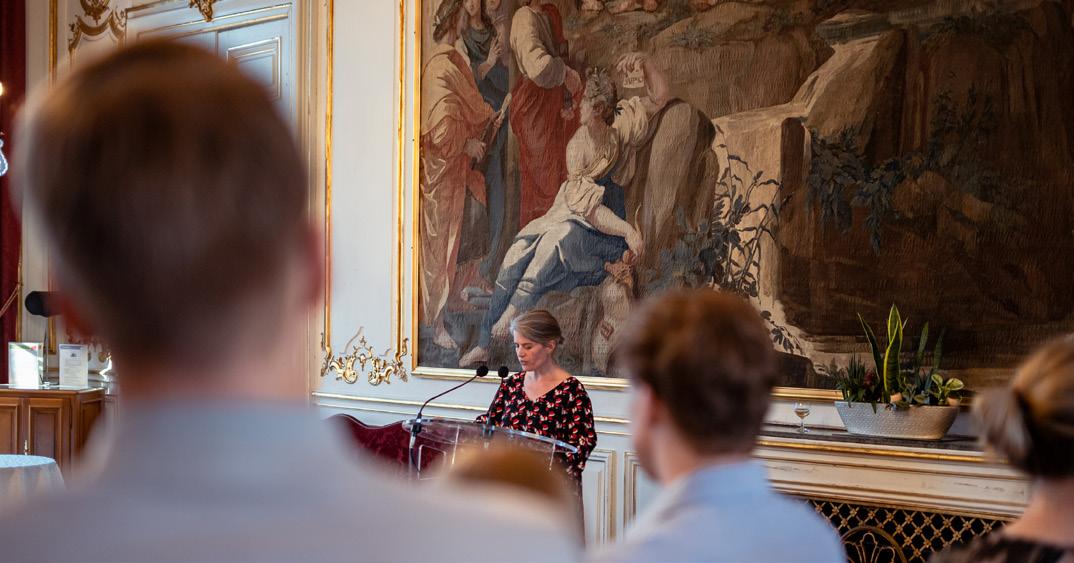
8 minute read
Helga Pedersen Moot Court Competition
SAMIRA SAFAROVA
Vice President in charge of Academic Activities
The Helga Pedersen Moot Court Competition, formerly known as the European Human Rights Moot Court Competition, grows in relevance and importance with every year, and being in charge of organising the 10th HPMCC was of utmost importance to me from the second I entered the office in August. Preparations and the organisation of the 10th Edition were achieved in several stages with the ever-lasting support of our HPMCC Team: Aušra Abraitytė, Giulia Maria Servida, Linnéa Regnell and Ketevan Makharashvili. It is my pleasure to present the sections:
Rebranding, Launch, and Mooting 101 Webinar
During the 79th International Council Meeting, the Council decided to rebrand the European Human Rights Moot Court Competition to carry the name of the first female Judge of the European Court of Human Rights - Helga Pedersen. In August, together with our Marketeer Tony, we put efforts into creating a logo which represents the values and objectives of the Competition towards externals. After developing the new logo, our focus was shifted to preparations of all necessary materials for the launch of the 10th edition which took place on the 20th of September 2021 and lasted until the 10th of November 2021. The Case was written by Zuzana Kovalova and Slavica Čubrić who addressed present-day legal matters related to natural disasters and environmental protection. Considering the rebranding, one of my main priorities for the 10th edition was to ensure that the competition with a new name could be delivered to a wide range of law students and young lawyers. With that purpose in mind, Mathieu and I organised a Mooting 101 Webinar during the registration period where Ms Dr Amaya Ubeda de Torres, who works at the Council of Europe as a Senior Legal Officer, shared her knowledge and experience on how to improve mooting skills; the presentation was followed by an introduction of both moot court competitions of ELSA and a Q&A. As a result of a strong commitment before and after the launch, we encouraged 59 teams from 26 different countries to test their motivation and skill in the field of human rights by registering for the 10th edition.
Written and Regional Rounds
Upon successfully closing the registration, we worked jointly with the HPMCC team on building and organising the Written and Regional Rounds. Like in the previous years, three ELSA Groups were appointed to organise the Regional Rounds: ELSA Kyiv (with ELSA Ukraine), ELSA Athens (with ELSA Greece) and ELSA Wrocław. Despite the fact that we intended to organise the Regional Rounds in a physical format, due to the ongoing Covid-19 pandemic and related restrictions the three Regional Rounds were held online, with the support of the Coderblock platform. While we were putting our efforts all together to overcome the challenge of the ongoing pandemic and virtualisation of the Regional Rounds, another unexpected obstacle was waiting for us which affected not just the organisation of the Moot Court Competition but all the truths that we, as law students and young lawyers, believe in - human rights, the foundation and the primary objective of the Helga Pedersen Moot Court Competition. With the beginning of the invasion of Ukraine in February, ELSA International had to postpone the Kyiv Regional Round from 4-6 March 2022 to 18-20 March 2022. From that moment onwards, the organisational responsibilities switched to ELSA International. I am truly grateful for all the contributions made by the Organising Committees of the Regional Rounds, especially: Elpiniki from ELSA Greece, Maciej from ELSA Wrocław, Adil and Oleksandr from ELSA Ukraine, for their hard work and dedication. With their help, we had the opportunity to gather teams on one virtual platform and to ensure the academic quality of the event despite all the challenges faced.
For the last stage - the Final Oral Round of the Competition - we welcomed, after two years of online edition, the best 19 teams to Strasbourg, France, to the Headquarters of the Council of Europe and the European Court of Human Rights. The standard Rules of the Competition allow the Organising Committee to invite only the best 18 teams based on their Written Submissions and Regional Round scores; however, for the 10th Edition, the Rules were amended to allow 19 teams to participate in the Final Oral Round to include one more team from Ukraine. The measure was taken in the light of the ongoing war in Ukraine to provide equal opportunities, with the rest of the participants, to our Ukrainian groups to continue taking part in the Competition even during these challenging times.
Neither the successes of the previous editions nor the return to the physical format could have been accomplished without the constant support and guidance of the Council of Europe and the European Court of Human Rights. With their help, every edition of this Competition brings human rights and the rule of law and democracy closer to law students and young lawyers across Europe. I would like to thank Ms Sophie Lobey who has been our main contact person in the Council of Europe for years and dedicated her precious time to supporting the Competition on all levels when we needed her wisdom and experience.
In addition to the Council of Europe and the European Court of Human Rights, every year we, as ELSA, have the honour and pleasure of collaborating with the Permanent Representations to the Council of Europe, and the 10th Edition marked the fruitful collaboration with the Permanent Representation of Spain, Permanent Representation of Hungary, Permanent Representation of the Netherlands and Permanent Representation of Italy. We are deeply grateful to all the Permanent Representations involved for their hard work in providing our participants with enjoyable reception environments during the Final Oral Round. I would like to extend my gratitude and express our utmost appreciation to the City of Strasbourg and Deputy Mayor Ms Cristelle Wierder for their excellent hospitality and for allowing our participants to create unforgettable memories in Strasbourg!
Not last but least, a big thank you should be sent to the members of the Academic Board and our dearest case authors with whom I truly enjoyed working throughout the year. It was an irreplaceable opportunity for me to have renowned experts by my side when I started my journey of organising the 10th Edition, and I could not wish for better supporters in this mission.



Testimonial from Slavica Čubrić and Zuzana Kovaľová, the Case Authors of the Helga Pedersen Moot Court Competition
The Helga Pedersen Moot Court Competition has reached its 10th anniversary this year. We would sincerely like to express our appreciation to Samira and her team at ELSA, who did justice to such a milestone.
We are honoured to be a part of this competition that was created for and by hundreds of students who have participated in this moot court throughout the years. Many of them continue to pursue their career in human rights all around the world, and some of them, have even been supporting younger generations of moot court participants as teachers or coaches. We have experienced many changes, challenges, and evolutions throughout the years. The introduction of regional rounds and online mooting has been some of the most recent ones. What remains a constant is the students’ knowledge and dedication to human rights and mastery of the facts of the fictional case.
In many ways, this year’s edition was a special one. From the organizational side, it was definitely one of the most successful and effective ones. ELSA was always prepared to deal with many logistical, professional, but also personal challenges. Samira had to deal with many non-standard situations, and she managed them with professionalism and grace. We would especially like to highlight the last-minute organization of the regional rounds in Kyiv, which had to move to a virtual space due to the war in Ukraine. She also managed to effectively deal with a number of questions concerning the participation of the Ukrainian teams, and we would like to emphasise Samira’s and ELSA’s integrity and professionalism with which the Ukrainian teams were accommodated.
Furthermore, after two years of travel and social restrictions, we were able to return to the hearing rooms in Strasbourg this year. Many of us have lost practice with organizing in-person events during these years, and ELSA did not have an easy task. We would like to express our appreciation for the way the final rounds were organized. Again, Samira, together with the members of the International Organising Committee, was able to work professionally in stressful situations and handled them effectively, including accommodating an unfortunate situation where some members of one team tested positively for Covid-19.
Throughout these ten years, numerous human rights experts and we have heard students plead on a number of contemporary legal issues, such as climate change, epidemic, use of artificial intelligence, gender-based harassment, compulsory vaccination for children, and ill-treatment of terrorist suspects, and so on. These are all legal questions that challenge us as lawyers and individuals and that have recently been or will soon be considered by the European Court of Human Rights, thus giving students a unique opportunity to be at the forefront of human rights protection.
We are so proud and moved to witness how the competition has developed into a widely recognised moot court competition in Europe and humbled that we play a part in it by drafting the case that students compete on. We would like to thank Samira and ELSA for keeping their interest, motivation, and dedication, which is a great inspiration to us and surely for the students as well. We wish Samira and all members of ELSA who were a part of this year’s moot court the best of luck in their further studies and careers. They are already on a great path, and we do not have any hesitations about their future success!









